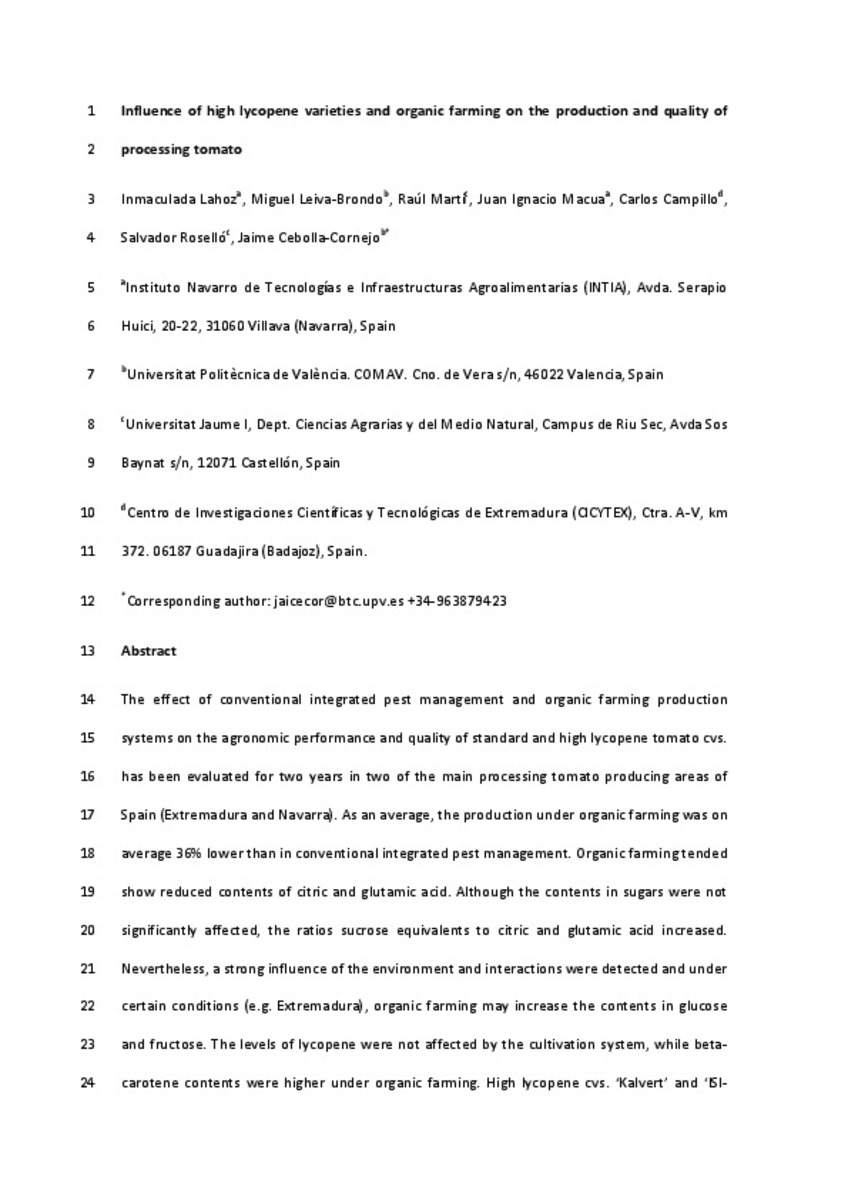Mostrar el registro sencillo del ítem
Influence of high lycopene varieties and organic farming on the production and quality of processing tomato
| dc.contributor.author | Lahoz García, Inmaculada | |
| dc.contributor.author | Leiva-Brondo, Miguel | |
| dc.contributor.author | Martí, Raúl | |
| dc.contributor.author | Macua, Juan Ignacio | |
| dc.contributor.author | Campillo, Carlos | |
| dc.contributor.author | Roselló, Salvador | |
| dc.contributor.author | Cebolla-Cornejo, Jaime | |
| dc.date.accessioned | 2016-06-14T13:58:47Z | |
| dc.date.available | 2016-06-14T13:58:47Z | |
| dc.date.issued | 2016 | |
| dc.identifier.issn | 0304-4238 | |
| dc.identifier.uri | http://hdl.handle.net/10234/160687 | |
| dc.description.abstract | The effect of conventional integrated pest management and organic farming production systems on the agronomic performance and quality of standard and high lycopene tomato cvs. has been evaluated for two years in two of the main processing tomato producing areas of Spain (Extremadura and Navarra). As an average, the production under organic farming was on average 36% lower than in conventional integrated pest management. Organic farming tended show reduced contents of citric and glutamic acid. Although the contents in sugars were not significantly affected, the ratios sucrose equivalents to citric and glutamic acid increased. Nevertheless, a strong influence of the environment and interactions were detected and under certain conditions (e.g. Extremadura), organic farming may increase the contents in glucose and fructose. The levels of lycopene were not affected by the cultivation system, while beta-carotene contents were higher under organic farming. High lycopene cvs. ‘Kalvert’ and ‘ISI-24424′ registered the highest lycopene levels, but with 27.6 and 28.1% lower production levels compared to ‘H-9036′, the cv. with the best agronomic performance. ‘Kalvert’, with high accumulation of sugars and high ratios sucrose equivalents to citric and glutamic acid and high lycopene contents would be an ideal material for supplying quality markets. ‘H-9997′ with intermediated levels of lycopene accumulation proved to be a good material combining production levels and functional quality. ‘CXD-277′ offered the higher values in variables related with organoleptic quality with intermediate lycopene accumulation but with lower production. | ca_CA |
| dc.description.sponsorShip | This research was funded by INIA (RTA2011-00062), FEDER and Gobierno de Extremadura (GRU 10130). | ca_CA |
| dc.format.extent | 28 p. | ca_CA |
| dc.format.mimetype | application/pdf | ca_CA |
| dc.language.iso | eng | ca_CA |
| dc.publisher | Elsevier | ca_CA |
| dc.relation.isPartOf | Scientia Horticulturae, 2016, vol. 204 | ca_CA |
| dc.rights | © 2016 Elsevier B.V. All rights reserved. | ca_CA |
| dc.rights.uri | http://rightsstatements.org/vocab/InC/1.0/ | * |
| dc.subject | Sugar | ca_CA |
| dc.subject | Acid | ca_CA |
| dc.subject | Quality | ca_CA |
| dc.subject | Carotenoid | ca_CA |
| dc.subject | Lycopene | ca_CA |
| dc.subject | Solanum lycopersicum | ca_CA |
| dc.title | Influence of high lycopene varieties and organic farming on the production and quality of processing tomato | ca_CA |
| dc.type | info:eu-repo/semantics/article | ca_CA |
| dc.identifier.doi | http://dx.doi.org/10.1016/j.scienta.2016.03.042 | |
| dc.rights.accessRights | info:eu-repo/semantics/openAccess | ca_CA |
| dc.relation.publisherVersion | http://www.sciencedirect.com/science/article/pii/S0304423816301613 | ca_CA |
Ficheros en el ítem
Este ítem aparece en la(s) siguiente(s) colección(ones)
-
CAMN_Articles [566]







